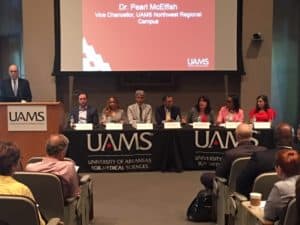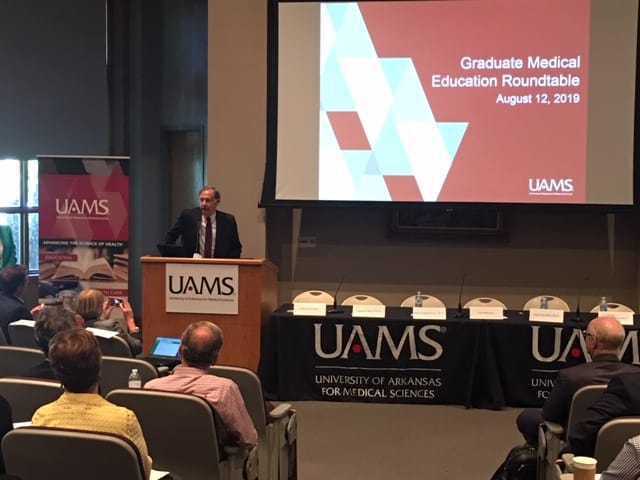Northwest Arkansas Summit Addresses Medical Residency Shortage
| FAYETTEVILLE – U.S. Sen. John Boozman, other state and local dignitaries, community leaders and health care experts today addressed the shortage of physician residency positions in Arkansas and how a bill being proposed by Boozman (“The Resident Physician Shortage Reduction Act”) can help.
Medical school graduates are required to complete residency training to practice medicine. However, a 1997 cap on Medicare support for Graduate Medical Education (GME) has stymied increases in residency training, creating a blockage in the physician workforce pipeline.
The GME Summit was held to enable policy makers and health care, education, community and business stakeholders to start a statewide dialogue focused on solutions to the growing residency shortage in Arkansas.
“The number of available physicians per population in the Natural State is among the lowest in the nation and providers of all specialties are facing a serious shortfall, especially in Arkansas’s rural communities,” said Boozman. “This isn’t just a problem we are facing in Arkansas. There is a physician shortage in hospitals across the nation and every state is struggling to fill the void. The bill Senator Bob Menendez and I introduced will lift the antiquated cap on Medicare-supported doctor training slots, creating 15,000 residency training slots across the country, over a five-year period. It is a small step, but one that will go a long way to addressing this dire need in Arkansas and at the national level.”
UAMS Chancellor Cam Patterson, M.D., MBA, said a nationwide physician shortage continues to remain real and significant.
“The latest data indicates a shortfall of up to 122,000 physicians by 2032, including significant shortages in both primary care and specialty categories. If action is not taken, Arkansas will soon have more medical school graduates than residency positions, forcing graduates to pursue residency training outside of the state,” Patterson said.
He said that adding residency positions would improve the chances for physicians to stay in Arkansas after completing residency because data shows that physicians are more likely to practice within 50 miles of their final residency training.
The GME Summit, co-sponsored by the University of Arkansas for Medical Sciences (UAMS) and the Northwest Arkansas Council, was held at the UAMS Schmieding Center for Senior Health and Education in Springdale.
The Northwest Arkansas Council worked with UAMS; the University of Arkansas; Northwest Arkansas medical systems; and a research firm throughout 2018 to fully understand the region’s health care needs. The research showed more physician residency positions among the top needs.
“Northwest Arkansas loses nearly $1 billion each year in economic impact due to the outmigration of health care services,” said Nelson Peacock, president and CEO of the Northwest Arkansas Council. “To reverse that trend, regional health care leaders developed a comprehensive plan to increase Graduate Medical Education, expand interdisciplinary research and establish a four-year medical school. In fast-growing regions such as Northwest Arkansas, federal funding restrictions prevent the health care sector from keeping pace with demand.
“Regional leaders are working collaboratively to address these challenges, and changes to federal policy that expand GME, such as those proposed by Senator Boozman, are critical. Increasing GME would allow us to train more doctors here and give us a better chance of retaining them in the long term,” Peacock said.
Christopher Westfall, M.D., dean of the UAMS College of Medicine, told attendees it will take multiple strategies to address the shortage.
Len Marquez, senior director of governmental relations for the Association of American Medical Colleges, gave an overview of the nation’s GME policy and how it affects the number of doctors who can practice medicine in the U.S. Marquez emphasized the importance of federal funding support, which would be increased through Boozman’s bill.
A roundtable group of government officials, health care providers and community leaders answered questions submitted by attendees prior to the event. The roundtable included:
- Arkansas state Sen. Missy Irvin
- Drake Rippelmeyer, M.D., physician at the Veterans Health Care System of the Ozarks and faculty member in the Internal Medicine Residency Program, UAMS Northwest Regional Campus
- Len Marquez, senior director of governmental relations, AAMC
- Pearl McElfish, Ph.D., vice chancellor for the UAMS Northwest Regional Campus
- Lashannon Spencer, CEO, Community Health Centers of Arkansas
- Nelson Peacock, president and CEO, Northwest Arkansas Council

Christopher Westfall, M.D., dean of the UAMS College of Medicine (at podium) lead a panel discussion on the importance of addressing the residency shortage. The panel included (l-r): Nelson Peacock, president and CEO, Northwest Arkansas Council; Arkansas state Sen. Missy Irvin; Drake Rippelmeyer, M.D., faculty member on the UAMS Northwest Regional Campus and physician at the Veterans Health Care System of the Ozarks; Len Marquez, senior director of governmental relations for the Association of American Medical Colleges; Lashannon Spencer, CEO, Community Health Centers of Arkansas; and Mikaila Calcagni, M.D., resident physician in the UAMS internal medicine program in Northwest Arkansas.
###
